This blog is now closed. You can find our continuing coverage here.
UK deaths rise by 55 to 46,566 as Indian health workers strike – as it happened
Tens of thousands demand better pay and protection as cases rise in the Philippines, Greece and Italy
Sat 8 Aug 2020 19.38 EDT
First published on Fri 7 Aug 2020 19.22 EDT- Evening summary
- Reopening schools 'a moral duty' – Johnson
- Johnson urged to help out travellers stuck in quarantine
- Ireland reports 174 new Covid-19 cases
- UK coronavirus-related deaths increase by 55 – government figures
- Afternoon summary
- Fifteen more coronavirus-related deaths in English hospitals
- Hundreds of thousands of UK home test kits recalled
- Face covering requirements extended in England
- 'Don't kill granny,' Preston council warns young people
- New Zealand prime minister Jacinda Ardern launches 'Covid election'
- Second wave outbreak in Melbourne has had 'knock-on effects' for Australia's economic recovery
- New South Wales records nine new cases of Covid-19
- Victoria records 466 new cases of coronavirus and 12 new deaths
- Donald Trump lauds coronavirus relief package in New Jersey
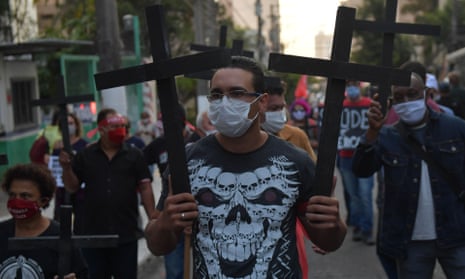
Live feed
- Evening summary
- Reopening schools 'a moral duty' – Johnson
- Johnson urged to help out travellers stuck in quarantine
- Ireland reports 174 new Covid-19 cases
- UK coronavirus-related deaths increase by 55 – government figures
- Afternoon summary
- Fifteen more coronavirus-related deaths in English hospitals
- Hundreds of thousands of UK home test kits recalled
- Face covering requirements extended in England
- 'Don't kill granny,' Preston council warns young people
- New Zealand prime minister Jacinda Ardern launches 'Covid election'
- Second wave outbreak in Melbourne has had 'knock-on effects' for Australia's economic recovery
- New South Wales records nine new cases of Covid-19
- Victoria records 466 new cases of coronavirus and 12 new deaths
- Donald Trump lauds coronavirus relief package in New Jersey
Evening summary
- Boris Johnson has insisted the nation has “a moral duty” to reopen schools next month, amid indications he would force pubs, restaurants and shops to close ahead of schools in the event of severe coronavirus flare-ups. The prime minister is understood to favour only closing schools as the last resort after scientific advisers warned more restrictions may be needed to reopen classrooms in England next month.
- Donald Trump said on Saturday that he would extend enhanced coronavirus unemployment benefits and employment taxes into next year with executive orders, but cut the level of some of the support. Speaking at his golf resort in Bedminster, New Jersey, Trump said he was taking action after Congress had failed to agree a deal, blaming “far left” Democrat demands in a campaign-style speech.
- Belgian police have made several arrests after a brawl broke out on a beach between officers and young people they had told to leave for refusing to respect virus safety measures. The clashes took place at the resort of Blankenberge, which is about 15km north of Bruges. A group of young people became violent after police told them to leave the beach, the daily Het Laatste Niewus reported.
- Cuba has placed Havana back on a strict lockdown following a rebound in coronavirus cases, ordering restaurants, bars and pools once more to close, suspending public transportation and banning access to the beach. Cuba, which has been hailed as a rare success story in Latin America for its textbook handling and containment of its coronavirus outbreak, had eased lockdown restrictions last month after cases dwindled to but a handful per day.
- Thousands of demonstrators gathered in the streets near the official residence of Israeli prime minister Benjamin Netanyahu in central Jerusalem. Throughout the summer, thousands of Israelis have taken to the streets, calling for Netanyahu to resign, protesting his handling of the country’s coronavirus crisis and saying he should not remain in office while on trial for corruption charges.
- Meat giant, Danish Crown announced Saturday it had closed a large slaughterhouse in Denmark after nearly 150 employees tested positive for the novel coronavirus. The abattoir in Ringsted, about 50 kilometres (30 miles) from the capital Copenhagen, employs nearly 900 people and slaughters tens of thousands of pigs every week.
Thousands of Australians trying to leave the country to visit sick family members, reunite with partners, or emigrate to another country of citizenship, have struggled with an exemption system they describe as opaque, arbitrary and dysfunctional.
Hannah Ryan has this report on the stresses of the application process:
More than 10,000 people have died from coronavirus in South Africa since the pandemic arrived in the country in March, the health ministry has said.
The country has registered 553,188 infections – the fifth biggest number of Covid-19 cases in the world.
Minister Zweli Mkhize said in his daily update statement on Saturday that 301 new virus-related deaths had been recorded.
“This means we have breached the 10,000 mark, with 10,210 cumulative deaths now recorded,” he said.
During an inspection of hospitals in the KZN province on Saturday, Mkhize added: “The peak is here, the peak is where we are.”
While South Africa is the continent’s hardest-hit nation in terms of infections, its mortality rate at around 1.8%, is one of the lowest among countries with high numbers of cases.
Reopening schools 'a moral duty' – Johnson
Boris Johnson has insisted the nation has “a moral duty” to reopen schools next month, amid indications he would force pubs, restaurants and shops to close ahead of schools in the event of severe coronavirus flare-ups.
Writing exclusively in the Mail on Sunday, Johnson said it the “national priority” to get all pupils back into classrooms in September after months without in-person education.
“This pandemic isn’t over, and the last thing any of us can afford to do is become complacent,” he wrote.
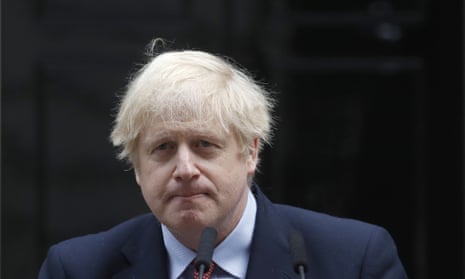
“But now that we know enough to reopen schools to all pupils safely, we have a moral duty to do so.”
He warned of the “spiralling economic costs” of parents and carers being unable to work, adding: “Keeping our schools closed a moment longer than absolutely necessary is socially intolerable, economically unsustainable and morally indefensible.”
MAIL EXCLUSIVE: @BorisJohnson : It’s a moral duty to reopen schools #TomorrowsPapersToday pic.twitter.com/bjdkpeTnfH
— Neil Henderson (@hendopolis) August 8, 2020
It comes after children’s commissioner for England Anne Longfield had said the reopening of schools “should be prioritised”, insisting they must be first to reopen and last to close during any reintroduction of restrictions.
However leading scientist and teachers unions have expressed concerns about the safety of the government’s plans to reopen schools.
According to the PA news agency, Johnson is understood to favour only closing schools as the last resort after scientific advisers warned more restrictions may be needed to reopen classrooms in England next month.
A No 10 source told PA on Saturday that Mr Johnson’s expectation is that schools would be the last sector to close, with firms being shut first in the event of severe local lockdowns.
“The PM has been clear that businesses including shops, pubs and restaurants should be forced to close first, with schools remaining open for as long as possible,” the source said.
But schools minister Nick Gibb said this week that the government cannot “decree” that classroom education would be prioritised, instead saying decisions would be made by local health chiefs.
Professor Chris Whitty, the chief medical officer for England, has warned the nation has “probably reached near the limit or the limits” of what can be done to reopen society safely.
And Professor Neil Ferguson, whose modelling led to the decision to impose the lockdown, suggested ministers would need to “row back on the relaxation of restrictions” to allow a full-time return to schools while keeping the virus under control.

Schools in England and Wales are braced for a fierce backlash from students and their parents this week, amid fears that A-level results to be published on Thursday will unfairly penalise disadvantaged students.
Since pupils were unable to sit their exams due to the pandemic, their grades will be calculated on the basis of teachers’ estimates, combined with a statistical model based on past results at the school and the student’s prior attainment. In Scotland last week thousands of students received poorer results than they expected when a similar system was used.
Read the full report:
Donald Trump has signed a series of executive orders intended to provide additional relief to address the coronavirus pandemic’s economic fallout after the White House failed to reach a deal with Congress.
Speaking at a news conference from his private golf club in the leafy New Jersey hamlet of Bedminster, the US president said the directives will extend federal unemployment benefits at $400/month (a $200 cut from the present amount), defer payroll tax through the end of 2020 (“most likely” retroactive to 1 July), defer and forgive interest on student loans and extend moratoriums on evictions, defer student loan payments and extend the federal moratorium on evictions.
You can follow the latest on this story on the US-focused coronavirus blog:
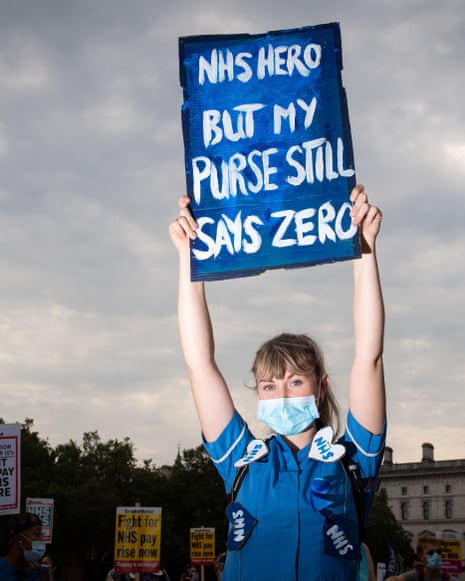
Healthcare workers and supporters took to the streets earlier today to protest over pay.
More than 30 marches across the UK were planned on Saturday amid growing anger over the absence of action to match gestures such as a weekly applause.
Here is a selection of photos of the crowds which converged across the country:
The fourth Covid-19 test result for Ohio governor Mike DeWine came back negative on Saturday after he received conflicting positive and negative results two days before, ahead of a scheduled meeting with President Trump, the Associated Press reports.
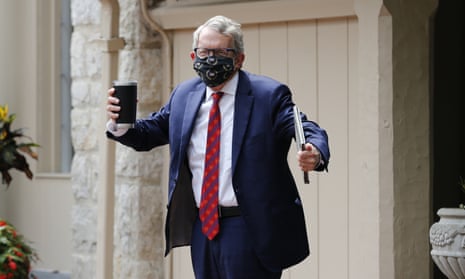
On Thursday DeWine was administered a rapid point-of-care antigen test ahead of a planned meeting with Trump, according to his spokesperson Dan Tierney, which gave a positive result.
Shortly afterwards he took a polymerase chain reaction test, which is the most commonly used test in the country and is considered the gold standard by medical professionals. More than 1.3 million Ohioans have been tested with it.
The results were checked twice, both negative.
The conflicting results underscore the problems with both kinds of tests and are bound to spark more questions about their reliability.
Johnson urged to help out travellers stuck in quarantine
Boris Johnson was under mounting pressure on Saturday to overhaul holiday quarantine rules and compensate those caught out while abroad, amid growing concerns over rising cases of Covid-19 in France.
A cross-party group of senior MPs, scientists and trade unions said that holidaymakers already staying in a country that has been added to the quarantine list should be given statutory sick pay during their two-week isolation, in an effort to improve compliance and help those unable to work.
My colleagues Jamie Doward, Michael Savage and Robin McKie have the full report:
“The last four years have felt pretty momentous,” says David Isaac, who left his position as chair of the Equality and Human Rights Commission on Saturday. “There’s Brexit, there’s the pandemic, there’s Grenfell, Windrush, #MeToo, and George Floyd and Black Lives Matter.”
In an interview with the Observer’s Jamie Doward, Isaac addresses the reasons for his departure, the lessons of Covid-19, and the absence of black EHRC commissioners, among other topics.
Read the full report here:
Belgian police have made several arrests after a brawl broke out on a beach between officers and young people they had told to leave for refusing to respect virus safety measures.
The clashes took place at the resort of Blankenberge, which is about 15km north of Bruges. A group of young people became violent after police told them to leave the beach, the daily Het Laatste Niewus reported.
Belgium is one of the countries worst hit by the virus in terms of its death rate and was one of the first countries to require people to wear masks outdoors in crowded areas.
To date it has recorded more than 72,000 infections and 9,866 deaths.
Cuba has placed Havana back on a strict lockdown following a rebound in coronavirus cases, ordering restaurants, bars and pools once more to close, suspending public transportation and banning access to the beach, Reuters reports.
Cuba, which has been hailed as a rare success story in Latin America for its textbook handling and containment of its coronavirus outbreak, had eased lockdown restrictions last month after cases dwindled to but a handful per day.
But they have risen back to April levels over the past two weeks, with the health ministry reporting 59 cases on Saturday and saying the situation could become “uncontrollable” if authorities did not act fast.
“We are witnessing a new epidemiological outbreak that puts our entire population at risk,” Cuban health minister José Angel Portal said during a daily coronavirus briefing on Saturday.

Cuba’s free community-based health system has been credited, along with measures such as strict isolation of the sick and their contacts, with allowing it to keep the number of cases under 2,900 with 88 deaths for a population of 11 million.
Authorities though have berated Cubans for letting their guard down after lockdown was eased, failing to socially distance or properly wear their face masks, which are obligatory in public spaces, and when gathering in big groups.
One of the latest major events of local transmission was traced back to a religious gathering.
But many of the new cases – 41 of the 59 reported on Saturday – are also imported, often from Venezuela. There is no open travel in Cuba due to the pandemic, so most returnees would likely be from the 20,000 health personnel stationed in Cuba’s leftist ally.
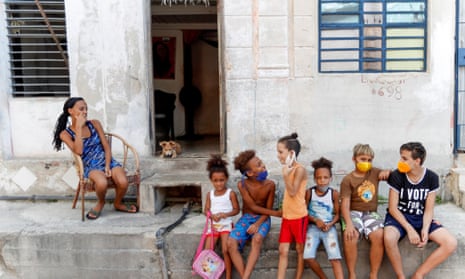
Anyone entering the country is required to quarantine in a state facility for 14 days so contagion from those cases is contained.
While Cuba’s outbreak is focused on Havana, Portal said authorities would need to monitor the rest of the country carefully given the large amount of asymptomatic carriers and nationwide travel that had occurred over the past month.
French tourist chiefs on knife-edge as country may be next on UK quarantine list
With France’s coronavirus cases accelerating quickly – 2,288 were reported on Friday, a steep rise from Thursday’s 1,604, following a 33% week-on-week increase between 27 July and 2 August – attempts to resuscitate the tourist sector are now under threat.
As the French health ministry warned last week that the country could lose control of the virus “at any time”, the chancellor Rishi Sunak said the government “would not hesitate” to add France to its quarantine list should the situation deteriorate.
Features writer Phil Hoad has the view from southern France in this report for the Observer:
Thousands of demonstrators have gathered in the streets near the official residence of Israeli prime minister Benjamin Netanyahu in central Jerusalem, the Associated Press reports.
It is a renewed show of strength as weeks of protests against the Israeli leader show no signs of slowing.
Throughout the summer, thousands of Israelis have taken to the streets, calling for Netanyahu to resign, protesting his handling of the country’s coronavirus crisis and saying he should not remain in office while on trial for corruption charges.

Self-employed workers whose businesses have been hurt by the economic crisis also joined Saturday’s march.
Though Netanyahu has tried to downplay the protests, the gatherings only appear to be getting stronger.
In Jerusalem on Saturday, protesters held Israeli flags, blew horns and chanted slogans against Netanyahu. Some held posters that read: Crime Minister or branded him out of touch. A large banner projected onto a nearby building said Balfour is in our hands, a reference to the street where Netanyahu lives.
The demonstrators accuse Netanyahu of corruption and the country’s bloated coalition government of failing to recognise the suffering of its citizens.
An estimated 1,000 people also protested at an intersection near Netanyahu’s beach house in the upscale coastal town of Caesaria.
There was a heavy police presence at the demonstrations but no reports of violence in the loud but orderly protests.
The rallies against Netanyahu are the largest Israel has seen since the 2011 protests over the country’s high cost of living.

After moving quickly to contain the virus last spring, many believe Israel reopened its economy too quickly, leading to a surge in cases. The country is now coping with record levels of coronavirus, while unemployment has surged to over 20%.
Many of the demonstrators, including a lot of young unemployed Israelis, accuse Netanyahu of mishandling the coronavirus crisis and the economic damage it has caused.
Netanyahu has dismissed the demonstrators as leftists and anarchists and inciting violence against him. He also accuses the local media of strengthening the demonstrations by giving them heavy coverage.
After sustaining lockdown losses, UK farmers are now cashing in on the boom in rural staycations by turning to camping and cottage rentals.
Tom Wall digs deeper into this emerging trend in the following report for the Observer:
Meat giant, Danish Crown announced Saturday it had closed a large slaughterhouse in Denmark after nearly 150 employees tested positive for the novel coronavirus.
The abattoir in Ringsted, about 50 kilometres (30 miles) from the capital Copenhagen, employs nearly 900 people and slaughters tens of thousands of pigs every week.
Danish Crown said 120 employees tested positive for the virus in a first round of tests of 600 employees present.
It then retested all the negative cases and detected 22 additional infections.
“For this reason, we are closing the abattoir for at least a week to try to break the chain of transmission among employees on site,” Danish Crown said in a statement.
All the employees must quarantine, said the company, one of Denmark’s biggest exporters and the biggest pork product producer in Europe.
Several European slaughterhouses have been hit with the virus in recent months, particularly in Germany.
The virus cluster at Ringsted is the main active one in Denmark, where the number of cases has increased sharply in recent days.
The resurgence has forced the government to abandon plans to ease restrictions at concert halls and night clubs, and instead prepare new curbs.
Several dozen infections have been registered in Aarhus, the country’s second biggest city.
The prime minister Mette Frederiksen said on Friday that Denmark intends to make masks compulsory on public transport, even though such a measure had not even been recommended recently.
Facing a new surge of coronavirus infections, one Spanish town is deploying special police units to nightclubs to enforce health regulations to stop the virus from spreading, the Associated Press reports.
The small beach town of Fuengirola near Málaga on Spain’s southern coast has sent police to its nightclubs which are a magnet for young people seeking summer fun to keep them from becoming virus breeding grounds.
“The police pressure that is carried out is essential so that people who are resistant to the law end up complying with it,” police officer Jorge Moreno said, adding that since 15 June , police have issued 2,000 sanctions for not complying with health regulations.
The special unit of 24 officers ensures that both workers and party-goers comply with the mandatory order to wear face masks and that clubs keep tables far enough apart to maintain social distancing between groups.

Nightclubs have been repeatedly cited by regional health authorities as sites of contagion. Northeast Catalonia has ordered them shut down.
Spain is struggling to keep an uptick in infections in check after it had managed to control an initial nationwide outbreak that forced the government to impose a strict three-month lockdown.
The health ministry on Friday reported the country’s highest daily increase in new infections since the lockdown ended in June, with 1,895 cases recorded, some 200 more than the previous day.
Spain has confirmed 28,503 virus deaths in the pandemic but experts say all numbers in all countries are undercounts due to limited testing, missed cases and other issues.